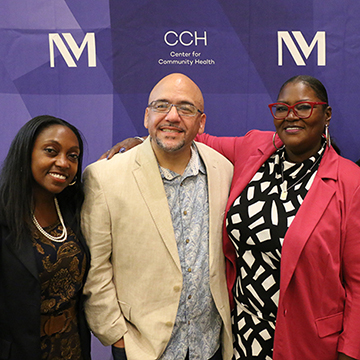Co-Creation and Resilience at the Community-Engaged Research Conference
To build an enduring, productive relationship between medical researchers and community members, the foundation must start with trust. That was the core theme last week when public health scientists, community organizations and students gathered on Northwestern University’s Chicago campus for the 2025 Community-Engaged Research Conference.
The event, held every summer, is an opportunity for those working in Chicago communities, to meet and discuss ongoing research and strategies to strengthen those relationships. It is co-led by the Institute for Public Medicine’s Center for Community Health and the Community of Practice for Community Engagement.
Darius Tandon, PhD, director of the Center for Community Health and chief of Intervention Science in the Department of Medical Social Sciences, opened the day by welcoming the audience.
“It’s safe to say that we as public health researchers and community groups are at an interesting time,” Tandon said. “There are so many unknowns, and that’s why we need to have this event. I’m hopeful that today will be a chance for academics to hear from our community. We need to better understand what we should be doing, so that within the coming weeks and months, we’ll be able to adjust to new changes.”

To really partner with a community, you need to ask yourself a few questions. Are you truly interested in working through the long, tough conversations even if, at the end of it, you might not get exactly what you we’re after?”
Joel Rodriguez, an organizer with The Southwest Organizing Project (SWOP), delivered the conference’s keynote address, setting the day’s tone as optimistically pragmatic.
“We are responding to a vision,” Rodriguez said. “Folks from this school, those of us who work and live in our city — we are here to be close to people, to listen, and to build the type of communities, families, and world that we all desire and deserve.”
Rogdriguez spoke about growing up in Southwest Chicago, and how aggressive policing of teenagers often exacerbated the “school-to-prison pipeline.” Anecdotes offered by Rodriguez included one about a high-school sophomore who was arrested and criminally charged after marking his desk with a crayon.
Rodriguez touched on his own experience joining a gang before finding a passion for organizing community groups and coaching young people. Since then, he has spent the past fifteen years with SWOP, helping to develop new programs and policies that address long-standing policy shortfalls. One recent success includes SB 100, a 2015 law that implemented comprehensive reforms to disciplinary action in Illinois schools.
Beyond his own work, Rodriguez spoke about the need for a deeper level of commitment from medical researchers who seek to understand Chicago’s communities. He challenged the audience to consider their own motivations in studying Chicago communities.
“To really partner with a community, you need to ask yourself a few questions,” he said. “Do you actually want to know these people? Are you truly interested in working through the long, tough conversations even if, at the end of it, you might not get exactly what you we’re after?”
To build stronger, more productive relationships, Rodriguez laid out five ideas that he believes form a strong foundation of a good community-researcher relationship.
- Relational power, not transactional engagement
- Co-creation, not extraction
- Shared power, not symbolic inclusion
- Long-term commitment, not short-term presence
- Accountability to community, not just the institutions
Rodriguez left the audience with a new metric to judge effectual work, underscoring its importance in the current national landscape.
“Let’s stop measuring our work by what we’ve built,” he said. “Let’s measure it by what survives the storm and who rises stronger on the other side.”
Following the keynote, attendees gathered for a networking session to discuss the lecture and what the day means to them.
“To hold a conversation like this at Northwestern was both powerful and necessary,” said Arais Benitez, a community partnership coordinator for the Alliance for Research with Chicagoland Communities (ARCC). “Joel’s presence as a community organizer brought urgency and clarity. His questions challenged us to think beyond comfort and urged the room to confront whether we are truly committed to transformative community partnership — or simply paying lip service to it.”
Written by Andrew Nellis




